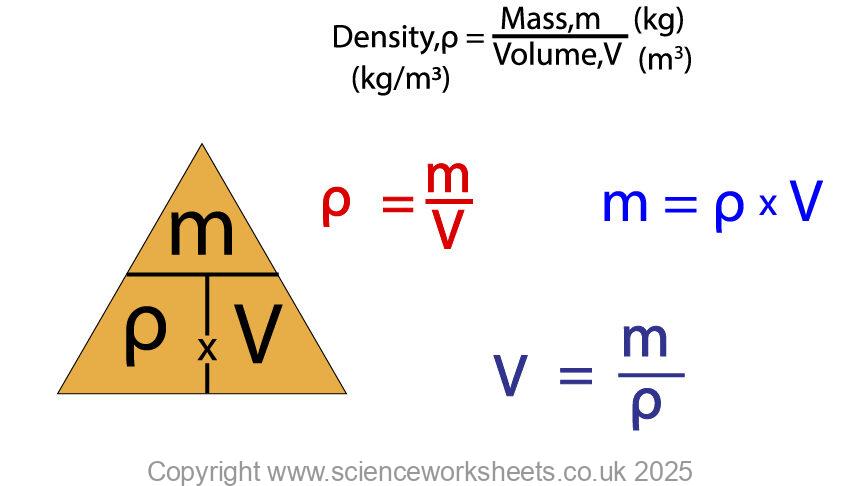AQA GCSE Density(Physics)
Density
Density is the amount of mass per unit volume.
Gases tend to have low density, whilst solids and liquids have higher density.

Calculation example
1.A solid metal bar has a mass of 400g and a volume of 0.5m3. Calculate the density of the metal bar.
Convert 400g to kg, so this is 0.4kg
Density = mass/volume
Density = 0.4/0.5 = 0.8 kg/m3
2.Calculate the volume of a gold bar which has a mass of 2000kg and a density of 19300 kg/m3.
Volume = mass/density
Volume = 2000/19300 = 0.104m3
3. Concrete has a density of 2300kg/m3. Use the diagram below to answer the following question.
 The concrete slab above has a mass of 4.6kg and is a cuboid shape with a length of 0.4m and width of 0.4m. Calculate the thickness of the concrete slab.
The concrete slab above has a mass of 4.6kg and is a cuboid shape with a length of 0.4m and width of 0.4m. Calculate the thickness of the concrete slab.
Density = mass/volume
Volume = mass/density
Volume = 4.6/2300 = 2 x 10-3 m3
Volume = length x width x thickness
2 x 10-3 = 0.4 x 0.4 x thickness
Thickness = 2 x 10-3/(0.4 x 0.4) = 0.0125m
Thickness = 0.0125m, or 1.25cm
Practice Questions
1.A small gemstone has a mass of 60g and a volume of 1.5 x 10-2 m3. Calculate the density in kg/m3
2.Calculate the mass of a sphere which has a volume of 9 x 10-2 m3 and density of 3.2 x 10-3 kg/m3.
3. Use the image below of a roll of plastic film to help you to answer the following question.

The film has a density of 3000 kg/m3 and mass of 20kg. If the film is uncoiled and laid flat it has a length of 3m x 1m. Calculate the thickness of the film.
Absorption and Emission of EM Radiation
JJ Thomson and Plum pudding model
Ernest Rutherford and the Nuclear Model
Niels Bohr changing the Nuclear Model
Discovering the Proton and Neutron
Measuring radiation from radioactivity
Radiation types and properties
Random nature of radioactive decay
Radioactive contamination or irradiation
Hazards of contamination and irradiation
Studies on the effects of radiation on humans
Different half lives of radioactive isotopes
Nuclear Fission Chain Reaction
Writing nuclear fission equations
Drawing ray diagrams for a concave lens
Drawing Ray Diagram to produce a virtual image for a convex lens
Drawing ray diagram to produce a real image for a convex lens.
Specular and Diffuse Reflection
Seeing Coloured Objects Part 2
Viewing objects through coloured filters
Transparent, Translucent and Opaque